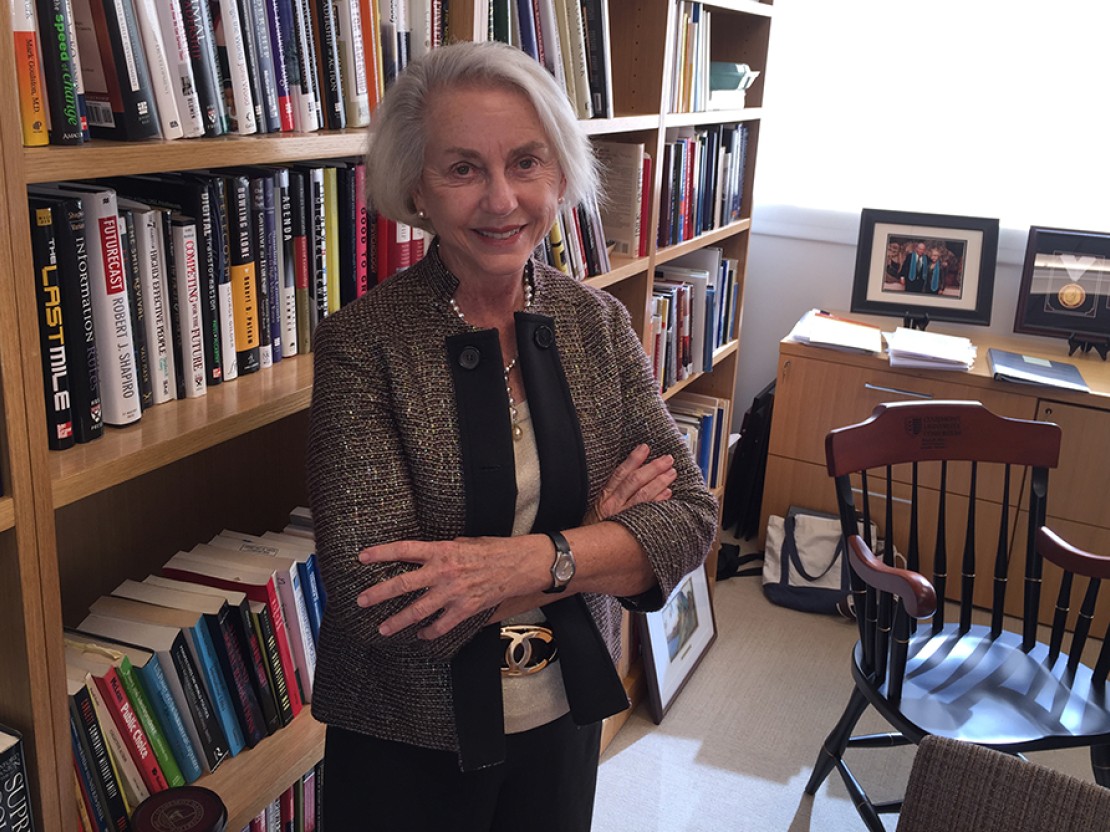“You need a very strong mission for any not-for-profit to grow, and CMC is one of the most mission-centric places I’ve ever been.”
Long before she led CMC to the conclusion of its $635 million Campaign for Claremont McKenna in 2012, Pamela Gann started out as a law professor at Duke University. This fall, CMC’s President Emerita returned to the classroom as the College’s new Trustee Professor of Legal Studies and George R. Roberts Fellow.
And although she says that serving as president and as professor are “two very different kinds of leadership” and loan themselves to “different presences on campus,” she approaches her new role at Claremont McKenna with the same holistic viewpoint that she had while leading us towards a record-breaking endowment and a record-setting period of growth and prosperity.
Professor Gann’s three new courses (a class on voluntarism and nonprofit, a class on international law, and a class on higher education) are listed under the Government offerings at McKenna, but they’re doing double-duty as Leadership classes, too. (Along with her titles as professor and Roberts Fellow, Gann is also a Senior Fellow of the Kravis Leadership Institute.)
It wouldn’t be a stretch to say that these classes could also double as philosophy classes: They allow students to develop an understanding of government, not-for-profit, higher education, and the private sector while asking them to think very broadly about the roles that not-for-profits have in the world today.
“CMC has the kind of students who want to have an impact on the world, and they understand that there’s an important role for nonprofits in our society, and they want to be a part of that,” she says. “But also very important is the emphasis today on understanding whether or not you’re having an impact, and how to measure that.”
Gann has invited real-life case studies into the classroom to illustrate her points. A forthcoming guest is a co-founder of GiveDirectly.com, a not-for-profit started by graduate students at MIT and Harvard. Student response has been terrific, she says, and her enrollments have quickly filled in both semesters.
“CMC students love to start things,” she says affectionately, “and you want to inspire them to be passionate, but they also need to … have realistic viewpoints about what the challenges are going to be.”
Considering her achievements as CMC president, Gann certainly could have had her pick of any institution for her return to teaching. In fact, she spent part of the 2013-2014 academic year back at Duke, where she’d received her law degree, began her academic career, and went on to become the law school’s dean.
But it’s apparent that Gann’s experience as CMC president has allowed her to see just why this is the right place for her to be teaching classes on leadership: “You need a very strong mission for any not-for-profit to grow, and this is one of the most mission-centric places I’ve ever been.”
But growth, as Gann well knows, is a key part of any mission, and the College’s capability to “bridge not just from the private for-profit sector to the government sector, but to embrace the non-profit sector” was a key part of her decision.
It’s more than just the mission of the institution she helped to shape and build that drew her back to teaching.
“I have had an opportunity to think about not-for-profits both from a Board standpoint and a leadership standpoint, and being a member within them,” she says, “so [this] is how I’m going to translate my leadership experience into my teaching experience. I couldn’t do that as effectively when I was a young professor. I didn’t have the experiences that I have now.”
It’s tempting to draw a metaphor directly to what we could easily call Gann’s other passion: trekking. During her year away from CMC, she also spent long, happy days trekking with friends over the Himalayas and the Tibetan Plateau, camping at altitudes of more than 16,000 feet on a daily basis.
At the end of the 2014-2015 academic year, she says she plans to take 40 days to walk Spain’s Camino de Santiago with a group of friends. She takes long treks, she says, not to start and finish in the same place, but to “keep on going, and come out at another location.”
And en route through vastly different cultures and over the vistas she describes as “remote,” “grand,” and “rewarding,” she finds herself with ever more clarity towards her own mission to her students.
“I become more convinced about how important educating our young people is for the world, whether it’s cultural or religious, or whatever. It adds to what I think is the importance of our curriculum of international relations, comparative politics, religion, language training, and travel,” she explains. “[Trekking] doesn’t change my commitment, but it reinforces it. It just heightens it.”
Yi Shun Lai ’96 is the nonfiction editor of the Tahoma Literary Review and a volunteer with the disaster-relief organization ShelterBox.
